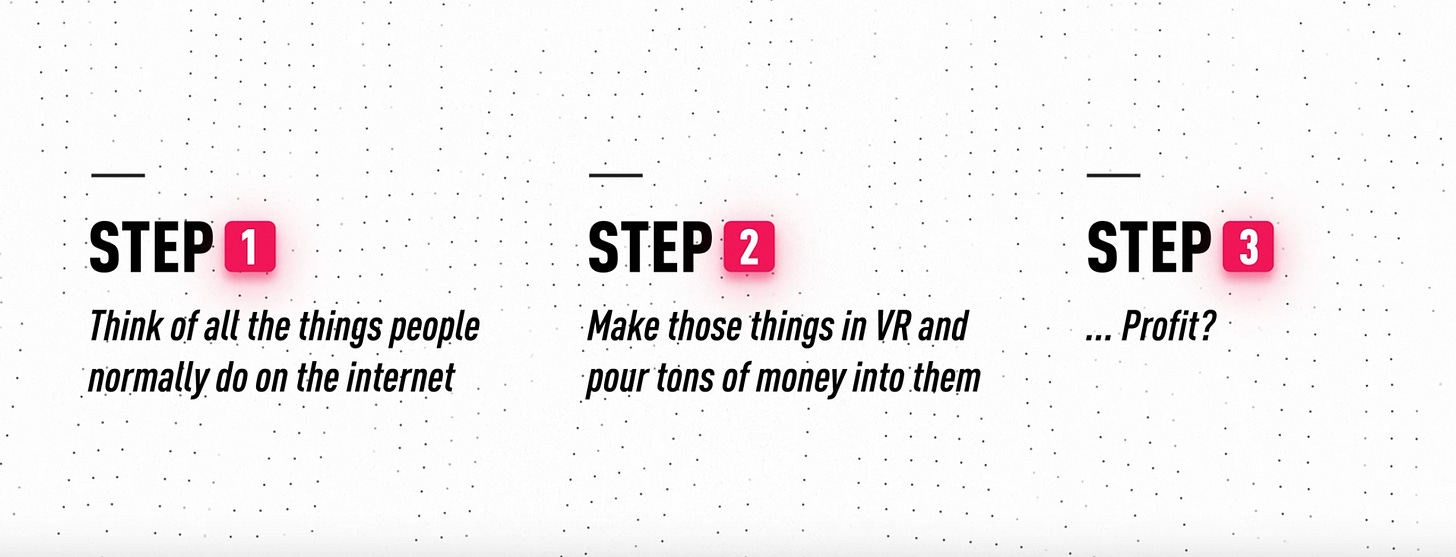🎧 To get this in podcast form instead: listen on Spotify or Apple Podcasts
(Note: I released a bonus podcast episode to subscribers last week. You’ll only get it if you’re subscribed to the podcast. If you’re not sure how to subscribe to a podcast, here’s how to do so on Apple Podcasts)

Today, we’ll be covering:
Eleven reveal - startup or story and why
Startup or Story? - Knock knock. Who's there? Effective Governance.
Related references
Sponsored read
Timeless Recommendation
Eleven Reveal
Before we get to this week’s Startup or Story, let’s start with a recap of last week’s pitch. Eleven was a pitch for a company that made the most realistic table tennis simulation in virtual reality, allowing you to take a game you love and play it anywhere with anyone.
As many of you guessed, that was…a real startup!
Eleven VR is a company that is, in their words, “obsessed with building the most realistic Table Tennis simulator the world has ever seen.” And I’ve used their product for almost two years now, and it is incredible. I was a VR skeptic, but early in the pandemic, my friend Gary convinced me to give VR a shot based on the reasonable price point of the Oculus ($299) and the ability to play ping pong with him during the pandemic.
The winning argument was his belief that despite him having played on the system, I would be able to beat him immediately because I was better at real ping pong. To me, that was a high bar. If you’ve ever tried to take a real world skill to a gaming environment, you know how often the skills struggle to translate. The fact that he was confident that my lackluster tech skills wouldn’t be a hindrance was enough for me to try it out.
And, I’m happy to report he was right. I beat him instantly and felt hooked. It was like I was in college all over again playing ping pong with him. It has captured real ping pong to somewhere around 97% fidelity by my estimation. There are still the occasional glitches or strange shots that wouldn’t work in reality, but for the most part, you are just playing regular ping pong.
Why is this interesting?
The reason this is interesting is because it is the perfect lens to analyze the direction of Meta (the company formerly known as Facebook).
As you may or may not know, Meta has been going through a turbulent time, and a lot of it has to do with CEO Mark Zuckerberg’s commitment to VR.
(This video is a great reference for those unfamiliar with the current state of VR and what Meta’s doing)
Here’s the relevant history.
Meta’s stock has taken a beating, down over 60% since the beginning of the year
They are spending upwards of $10 billion a year on VR and building out the metaverse, an insane amount given the low rate of VR adoption
A major shareholder, Altimeter, published an open letter to Meta asking for many things, one of them being cutting Meta’s spend on VR in half
Amidst these issues, CEO Mark Zuckerberg has seemingly ignored the pressure from shareholders and the stock market and doubled down on his VR roadmap. He debuted a new VR headset priced at $1,500 that largely underwhelmed the public.
Now you’re up to speed. The prevailing narrative is Mark Zuckerberg is letting his love for VR cloud his judgment and he’s risking Meta’s future in the process.
I have two hot takes as it relates to this.
Hot take 1 - Zuckerberg should be lauded for his bold ambition, not ridiculed.
When LeBron James chose the Heat in the summer of 2010, he was crushed for leaving to join another superstar (Dwyane Wade) instead of doing it on his own. “Jordan would never have done that” said the masses.
so what?!?! Yes, he’s not Jordan. Yes, he’s joining another superstar. What the heck is the problem with that? As a fellow male in my early 20s, I’d sure as heck rather live in Miami(!) than Cleveland for the next years of my life with a great basketball buddy and great team. Why does Lebron have to answer to any expectations other than his own? We tend to project onto our athletes our own desires for them, forgetting that they too are human and can and should have their own desires.
The same logic applies to Mark Zuckerberg here. Yes, he’s ignoring shareholder pressure. Yes, the stock is getting crushed. (By the way, just imagine if Zuckerberg were to double down on stock performance? Wouldn’t that just mean more political advertising and misinformation on Facebook and creepier ads on Instagram? Ew.) Yes, he might be risking the entire company’s future. (Sorry, but Facebook employees are not exactly damsels in distress in need of protection.)
But Mark Zuckerberg is going to be a billionaire regardless of what happens with Meta. If he really believes in the potential of VR, why not take a crazy shot at bringing the future forward? If I were Mark’s friend, I’d be really proud of him for his willingness to stick with a vision despite the external chorus ringing in his ears.
Hot take 2 - Zuckerberg’s mistake is not his ambition, but his execution.
This is where we come back to Eleven. I think Zuck’s mistake is not going after VR - it’s how he’s going after VR.
In the video above, MKBHD explains Meta’s strategy for building out VR.
I think that Meta’s strategy is wrong. Specifically, Step 1.
VR shouldn’t be going after things people normally do on the internet…VR should be going after things we do in real life!
It’s in the damn name - virtual reality. Taking real-life experiences and creating magical versions of them in VR is the most mind-blowing application. Look at ping-pong. A fun activity enjoyed by many.
Now, in VR, you can take everything about ping pong, but make it more magical. In what ways can virtual ping-pong surpass the real thing?
Play with anyone, no matter where they are.
Play anywhere, even outside! Ever tried playing ping pong outside? The ball is too light and it just doesn’t work most of the time.
Play in a space you design, curate and make your own! And change it whenever you want.
Play with an AI partner that’s designed to be the perfect level for you. I can’t tell you how great that is. (As someone obsessed with learning, I think there’s huge potential in this. The AI partner always keeps you in the zone of proximal development - the gap between what a learner has mastered and what they can potentially master with support and assistance. In a few years, this will be the best ping-pong tutor money can buy. Imagine a similar tutor for math one day?!)
These things are all nearly impossible in the physical world. Take the AI partner - try to imagine that in the real world. A robot that could play against you at exactly the right level. Even the most amazing robots look to be far away from being able to do that.
Meta shouldn’t try to compete with Internet gaming on a battlefield of improving graphics and latency. Compete with the real world instead, taking experiences that are better suited to virtual environments and then highlighting the basic advantages that software and the Internet can bring to a real-world experience.
It shouldn’t cost $10 billion to build the metaverse. From what I’ve seen with Eleven, with a couple million dollars, I think ping-pong could be the first absolutely awesome application in the metaverse. You need to get little things right, like being able:
To put on your headset and get into the game within 30 seconds
To design your space and allow spectators to hang out in the room
To seamlessly stream the match on your TV so parents can watch their kids
To form teams and leagues
These aren’t insurmountable challenges. The hard part of building a damn ping pong simulator is done. Now it’s just about dotting the i’s and crossing the t’s to make it a totally magical experience.
To summarize, here’s my open pitch to Meta.
I respect your commitment to VR and the metaverse
It’s not about how much you spend. It’s about how you spend.
Don’t try to replace internet-native activities.
Replace real-world activities instead.Invest in specific experiences to make them better than reality.
Example: For ping pong, you can already do that for millions, not billions. Invest until Eleven is the best table tennis facility on the planet. So people can host birthday parties there. So parents can let their kid hang out playing ping-pong instead of scrolling TikTok. Do everything you can to make the process of playing ping-pong seamless. Better than reality.
Anyways, this is why Eleven is so interesting to me. It’s not quite there, but it’s close to being the type of VR experience that could get me to force my childhood ping pong buddies to get a Quest. If anyone wants to play some ping pong and has a VR device, let me know.
Startup or Story? Part 3
Don’t forget to comment on the video with your guess (on YouTube please!) Subscribe to the channel. And hit that like button. (Also, feel free to reply with any other feedback)
Related References
A few resources to go deeper down the rabbit hole of this week’s business.
The Only Crypto Story You Need, by legendary finance writer Matt Levine (fair warning: it’s 40k words so it really is the only one you need lol)
Policy Proposals for Crypto Protocols to Make Them Less Dystopic and More Inclusive
This week’s WIBAI is brought to you by…The Maker’s Dream
I wish shameless plugs were less awkward, so I’m pretending this is just a sponsorship instead.
Artificial intelligence is all the rage these days, with new mind-blowing developments nearly every week (just click any of the links above). With all those developments, there’s no better time to start considering the prospect of some truly outlandish scenarios with AI. Boy have I got the place to get you started. The Maker’s Dream is a critically-acclaimed sci-fi novel about a world taken over by a seemingly benevolent artificial intelligence.
What do critics have to say? “A mind-blowing thought experiment”, “…a shittier Neal Stephenson novel”, and “not bad” are just a few of the reviews.
There are still 51 copies of the book left in my closet. Help me out - click the link to buy a signed copy as a gift for a friend who might like it!
Timeless recommendation
Kyrie Irving has been in the news this past week, and not for any good reason (no links - if you know, you know). These recommendations are never meant to be related to the current zeitgeist, so I’ll deliberately go against it.
What is Kyrie chasing? And why is he chasing it without LeBron?
This is a piece reported by Jackie MacMullan, a legendary sports reporter, back in 2018 when Kyrie left Cleveland (and LeBron) for the Boston Celtics. Too often, we want to label people good and bad, right and wrong, based on a few actions. In the media these days, these narratives seem almost pre-written. While everyone’s quick to throw stones, read this piece and reflect on a complex path and a complicated individual.
Tune in next week for a look at a familiar business model applied to the latest craziness in the courts.
Last but not least, this week’s Be Real pic is a little different cause I’m using AI here instead. I uploaded 7 selfies to a free service called Vana to see what kind of portraits it could generate. The 7 pictures I uploaded are on top - 7 of my favorite AI generations are on the bottom.
Not going to lie, wish I had uploaded a few smiling pictures, because our AI overlords seem to have confused my goofiness for wickedness. I’m afraid that means I might be eliminated as an enemy early in their reign.
Wouldn’t It Be Awesome If…? is the beginning of many questions I ask myself about the future. WIBAI has become my place to attempt to make sense of the world we live in and imagine ways to make it better.
I don’t check unsubscribe alerts and never look at my subscriber list. So if this isn’t for you, you can unsubscribe below.
Thanks for reading Wouldn't It Be Awesome If...?! Subscribe for free to receive new posts.




